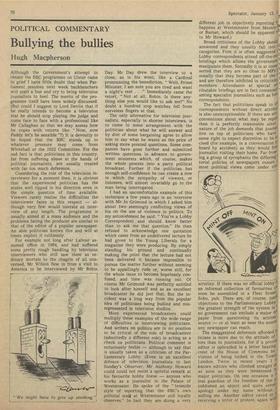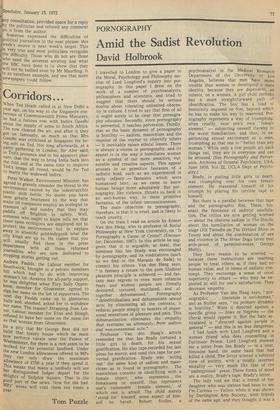POLITICAL COMMENTARY
Bullying the bullies
Hugh Macpherson
Although the Government's attempt to censor the BBC programme on Ulster came to grief I have little doubt that when Parliament resumes next week backbenchers will start a hue and cry to bring television journalists to heel. The merits of the programme itself have been widely discussed. (But could I suggest to Lord Devlin that if he really intends to become a television star he should stop playing the judge and come face to face with a professional like Mr Callaghan so that we may assess how he copes with retorts like "Now, now Paddy let's be sensible "?) It is devoutly to be hoped that the BBC stands up to whatever pressure may come from Whitehall or the 1922 Committee. For the sad fact is that politicians in this country, far from suffering abuse at the hands of political journalists, are usually treated with far too much deference.
Considering the role of the television interviewer for a moment then, it is obvious that the experienced politician has the scales well tipped in his direction even in the simple question of time available. Viewers rarely realise the difficulties the interviewer faces in this respect — although very few would tolerate an interview of any length. The programme is usually aimed at a mass audience and the problems facing the producer are similar to that of the editor of a popular newspaper. An able politician knows this and will at times exploit it ruthlessly.
For example not long after Labour assumed office in 1964, and had suffered some pretty rough handling by television interviewers who still saw them as ordinary mortals to the chagrin of all concerned, Mr Wilson flew in from a visit to America to be interviewed by Mr Robin Day. Mr Day drew the interview to a close, as is his wont, like a Cardinal pronouncing the benediction, "Well, Prime Minister, I am sure you are tired and want a night's rest . . ." Immediately came the retort, "Not at all, Robin. Is there anything else you would like to ask me?" No doubt a hundred stop watches fell from nerveless fingers at that.
The only alternative for television journalists, especially in shorter interviews, is to come to some arrangement with the politician about what he will answer and by dint of some bargaining agree to allow him to say what he wants as the price of asking more pointed questions. Some companies have gone further and submitted written questions in advance to government ministers which, of course, makes the whole process into a party political broadcast. Further if the politician has enough self-confidence he can create a row in which the sympathy of viewers, or listeners, will almost invariably go to the man being interrogated.
I had an uncomfortable example of this technique a few years ago in an 'nterview with Mr Jo Grimond in which I asked him about two seemingly conflicting views of his on the use of violence in politics. To my astonishment he said: "You're a Lobby Correspondent and should know better than to ask me that question." He then refused to acknowledge one quotation which came from an undelivered lecture he had given to the Young Liberals for a magazine they were producing. By simply standing his ground and continually making the point that the lecture had not been delivered it became impossible to pursue the matter further without seeming to be appallingly rude or, worse still, for the whole issue to become hopelessly confused, and time was running out. Of course Mr Grimond was perfectly entitled to look after himself and as an excellent broadcaster he did just that. But the incident was a long way from the popular idea of politicians being bullied and misrepresented in television studios.
More experienced broadcasters could multiply these examples of the wide range of difficulties in interviewing politicians. And writers on politics are in no position to be critical of the role of broadcasters (admittedly a different role) in acting as a check on politicians. Political comment is notoriously feeble — although to saY that is usually taken as a criticism of the Parliamentary Lobby. (Even in an excellent defence of television journalists in last Sunday's Observer, Mr Anthony Howard could could not resist a spiteful remark at his favourite hobby horse — anyone who works as a journalist in the Palace of Westminster. He spoke of the "bromide style of reporting that the BBC's own political staff at Westminster still loyally observes." In fact they are doing a very
different job in objectively reporting happens at Westminster from Messrs or Burnet, which should be apparent el c to Mr Howard.)
Broad criticisms of the Lobby should answered and they usually fall into 1categories. First it is often suggested 1\. Lobby correspondents attend off-thereo brief ings which allows the governmenl manipulate them. Secondly it is at times serted that they are so close to MPs I sonally that they become part of the and are therefore inhibited in criticising t members. Attendance at special uill ributable briefings are in fact commonPll among specialist journalists such as fore correspondents.
The fact that politicians speak to 10 , correspondents without direct attribtl' is also unexceptionable. If there are stric conventions about what may be report: then it is perfectly reasonable since. nature of the job demands that journal' live on top of politicians who have same right to expect discretion to be 0 cised (for example, in a conversation ar heard by accident) as they would frorl journalist visiting their home. Far froin ing a group of sycophants the differing tonal policies of newspapers ensure t, most political views come under ctl scrutiny. If there was no official lobby tl an informal collection of favourites c0l soon be assembled in a Fleet Streetli Soho, pub. There are, of course, just' objections to the Parliamentary LobbY the greatest strength of the system is 11 no government can exclude a major nel paper from questioning its actionS source — or at least as near the source any newspaper can reach. The exaggerated deference afforded rt ticians is more due to the attitude of tors than to journalists, for if a provill, editor is upbraided in a letter bearing, crest of the House of Commons he ' visions of being locked in the ToWef London. Twice in recent years I 11: known editors who climbed straight dc as soon as they were threatened 13) major politician. On one occasion a 3l less guardian of the freedom of the Pr published an abject and quite errone, apology under my name without LL suiting me. Another editor caved in receiving a letter of protest, again wit" pany consultation, provided space for a reply elby the politician and refused any comment on it from the author. d Someone expressed the difficulties of tpolitical journalism in the neat phrase: this tjweek's source is next week's target. This cos very true and most politicians recognise it the difficulty. Those who do not are those s who need the severest scrutiny and what p the BBC have done is to show that they ewill not be bullied even by Mr Maudling. It g is an excellent example, and one that more newspapers could follow.
,11











































 Previous page
Previous page